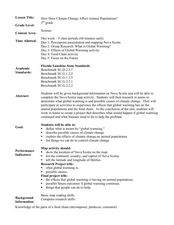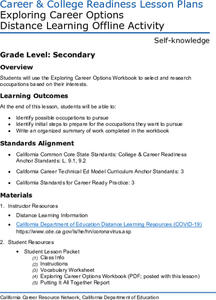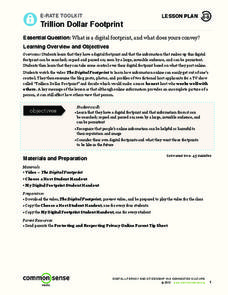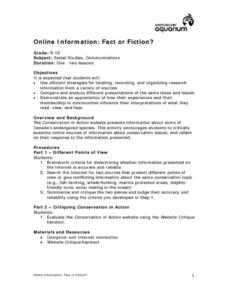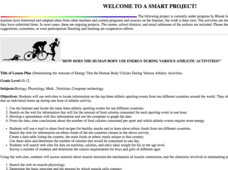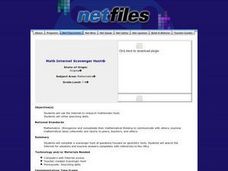WindWise Education
How Does Energy Affect Wildlife?
Is wildlife affected the same way by different electricity generation methods? Teams work together to research four electricity generation sources and their impacts on wildlife. The teams create a summary report and share their...
Curated OER
Abraham Lincoln- An Internet Buddy Activity
Students research the life of Abraham Lincoln. In this Abraham Lincoln lesson, students use the Internet to discover facts about his life. Students practice using Internet tools.
Personal Genetics Education Project
How Does Ancestry Testing Work? Exploring Admixture Testing
Find out the science behind ancestry testing! Investigators watch a video exploring how ancestry works before participating in a hands-on group activity. Scholars role play scientists while learning about testing protocols and test...
California Department of Education
Evaluating Web Sites
If it's on the Internet, it must be true—right? How can someone tell if a website contains less-than-truthful information? Savvy surfers evaluate sources in the fifth of a six-part college and career readiness instructional activity...
Curated OER
How Does Whale Blubber Work?
Students perform an experiment to find out how whale blubber keeps whales warm in cold temperatures. They use Ziploc bags lathered in shortening to simulate whale blubber. They put their hands in cold water, both with and without the bags.
TryEngineering
Search Engines
Introduce search engines with an activity that models how search engines work and the different algorithms they employ. Working in groups, class members then build search queries to demonstrate the knowledge learned.
Curated OER
How Does Climate Change Affect Animal Populations?
Learners investigate the effect of climate change on animal population in Nova Scotia. In this environmental science lesson, students complete a Nova Scotia map activity and research the causes of global warming in small groups. Learners...
Curated OER
How Balanced Are You?
Young learners take a look at what they eat in one day and compare it to how much physical activity they do on that same day. Point out that this is only a one-day glimpse at balancing the energy going in and what energy being used. They...
The New York Times
Sequencing the Stages: Understanding H.I.V. Infection at the Molecular Level
How does HIV operate at the molecular level? Pupils discover the progression from a healthy immune cell to one infected with HIV, watch an animation of the HIV life cycle, and finally identify each of the stages with illustrations...
Newseum
Putting the Consumer's Questions to Work
Who, what, when, where, why, and how are good questions to ask when evaluating a source. First, scholars find two sources of information relating to a chosen topic. Next, pupils complete a worksheet to gauge the source's credibility....
New South Wales of Education and Communities
Setting the Scene
How to establish a safe classroom environment for discussion is the focus of this introduction to a series of six resources devoted to personal safety.
California Department of Education
Exploring Career Options Distance Learning Offline Activity
It makes sense that people who choose a career that matches their interests are happier than those who don't. But the big question is, how does one find a career that matches their interests? High school seniors explore career options by...
Common Sense Media
Trillion Dollar Footprint
Learners explore their digital footprints, and discover how information they put online can easily be searched, copied, forwarded, and seen by a large audience.
Curated OER
Online Information: Fact or Fiction
Discuss ways to determine if the information middle and high schoolers gather online is accurate. Using the Internet, they cite two sources that show conflicting points of view on a subtopic of conservation. They summarize and analyze...
California Department of Education
In the Interview Hot Seat
Interviews can be so stressful. How does someone stay calm and confident in the interview hot seat? Senior job seekers get acquainted with common interview questions during the fifth of six career and college readiness lessons....
Curated OER
All In a Day's Work
Students explore contributions made by working animals. In this service learning lesson, students research working animals and design posters or multimedia presentations regarding the animals, contributions to society.
Discovery Education
Sonar & Echolocation
A well-designed, comprehensive, and attractive slide show supports direct instruction on how sonar and echolocation work. Contained within the slides are links to interactive websites and instructions for using apps on a mobile device to...
College Board
Evaluating Sources: How Credible Are They?
How can learners evaluate research sources for authority, accuracy, and credibility? By completing readings, discussions, and graphic organizers, scholars learn how to properly evaluate sources to find credible information. Additionally,...
Facebook
Introduction to Privacy
Sharing may be caring, but how much is too much? Young digital citizens ponder personal information during a activity from a module about privacy and reputation. Individuals take a survey, then mingle with classmates in a privacy game...
Council for Economic Education
A Penny Saved
A penny saved is a penny earned! Scholars research the different ways to save money over a lifetime. They investigate the Rule of 72, compound interest, and sub-prime loans to gain an understanding of how banks aid in the saving process....
Southern Poverty Law Center
Evaluating Online Sources
All sources are pretty much the same, right? If this is how your class views the sources they use for writing or research projects, present them with a media literacy lesson on smart source evaluation. Groups examine several articles,...
British Council
Unit 6: Enquiries
So many questions! How do people in the business world answer them? Young communicators demonstrate their understanding of correct grammar in the sixth of nine lessons focused on developing career skills. Types of questions range from...
University of Rhode Island
How Does the Human Body Use Energy during Various Athletic Activities?
Students investigate how much energy is used during different athletic activities. They conduct Internet research to obtain information on the top three athletic sporting events from around the world, and calculate the calories burned...
Curated OER
Math Internet Scavenger Hunt
Students utilize online research skills to surf the Internet and complete an online scavenger hunt to find the answers to various mathematical questions.








